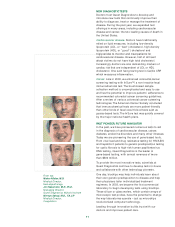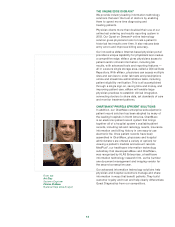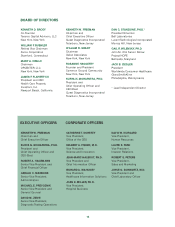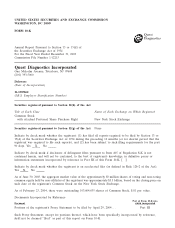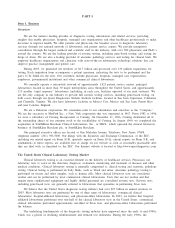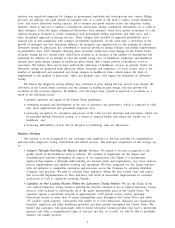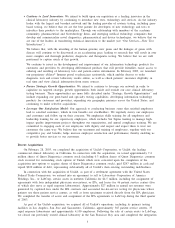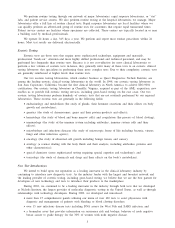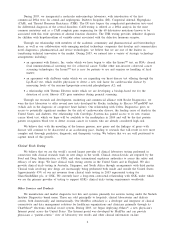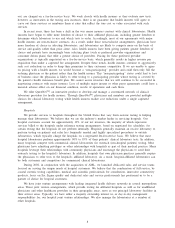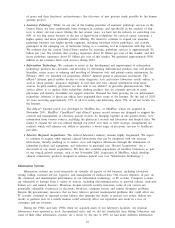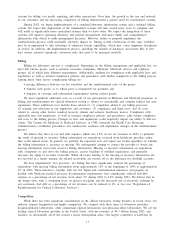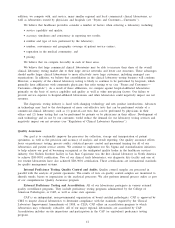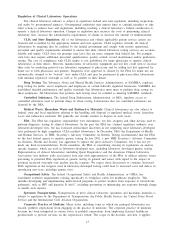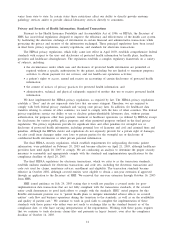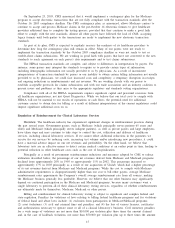Quest Diagnostics 2003 Annual Report Download - page 22
Download and view the complete annual report
Please find page 22 of the 2003 Quest Diagnostics annual report below. You can navigate through the pages in the report by either clicking on the pages listed below, or by using the keyword search tool below to find specific information within the annual report.We perform routine testing through our network of major laboratories, rapid response laboratories, or “stat’’
labs, and patient service centers. We also perform routine testing at the hospital laboratories we manage. Major
laboratories offer a full line of routine clinical tests. Rapid response laboratories are local facilities where we
can quickly perform an abbreviated group of routine tests for customers that require rapid turnaround times.
Patient service centers are facilities where specimens are collected. These centers are typically located in or near
a building used by medical professionals.
We operate 24 hours a day, 365 days a year. We perform and report most routine procedures within 24
hours. Most test results are delivered electronically.
Esoteric Testing
Esoteric tests are those tests that require more sophisticated technology, equipment and materials,
professional “hands-on’’ attention and more highly skilled professional and technical personnel, and may be
performed less frequently than routine tests. Because it is not cost-effective for most clinical laboratories to
perform a low volume of esoteric tests in-house, they generally refer many of these tests to an esoteric clinical
testing laboratory that specializes in performing these more complex tests. Due to their complexity, esoteric tests
are generally reimbursed at higher levels than routine tests.
Our two esoteric testing laboratories, which conduct business as Quest Diagnostics Nichols Institute, are
among the leading esoteric clinical testing laboratories in the world. In 1998, our esoteric testing laboratory in
San Juan Capistrano, California, became the first clinical laboratory in North America to achieve ISO-9001
certification. Our esoteric testing laboratory in Chantilly, Virginia, acquired as part of the AML acquisition, now
enables us to provide full esoteric testing services, including gene-based testing, on the east coast. Our two
esoteric testing laboratories perform hundreds of esoteric tests that are not routinely performed by our regional
laboratories. These esoteric tests are generally in the following fields:
•endocrinology and metabolism (the study of glands, their hormone secretions and their effects on body
growth and metabolism);
•genetics (the study of chromosomes, genes and their protein products and effects);
•hematology (the study of blood and bone marrow cells) and coagulation (the process of blood clotting);
•immunology (the study of the immune system including antibodies, immune system cells and their
effects);
•microbiology and infectious diseases (the study of microscopic forms of life including bacteria, viruses,
fungi and other infectious agents);
•oncology (the study of abnormal cell growth including benign tumors and cancer);
•serology (a science dealing with the body fluids and their analysis, including antibodies, proteins and
other characteristics);
•special chemistry (more sophisticated testing requiring special expertise and technology); and
•toxicology (the study of chemicals and drugs and their effects on the body’s metabolism).
New Test Introductions
We intend to build upon our reputation as a leading innovator in the clinical laboratory industry by
continuing to introduce new diagnostic tests. As the industry leader with the largest and broadest network and
the leading provider of esoteric testing, including gene-based testing, we believe that we are the best partner for
developers of new technology and tests to introduce their products to the marketplace.
During 2003, we continued to be a leading innovator in the industry through both tests that we developed
at Nichols Institute, the largest provider of molecular diagnostic testing in the United States, as well as through
relationships with technology developers. During 2003, we developed and introduced:
•more than 15 comprehensive panels utilizing our menu of over 100 tests to assist physicians with
diagnosis and management of patients with bleeding or blood clotting disorders;
•over 15 new infectious disease tests including DNA assays for West Nile and SARS infection; and
•a biomarker assay that provides information on recurrence risk and biologic behavior of node negative
breast cancer to guide therapy for the 30% of women with node negative disease.
5



